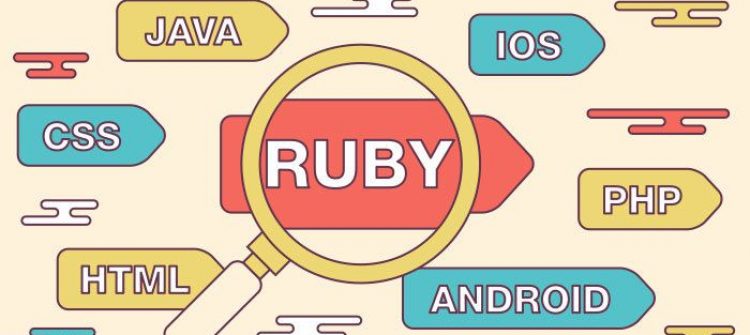Step by step Ruby on Rails Guide for Newbie


Many tech companies like Airbnb, Hulu, GitHub, and Shopify utilize the same front-end framework for web design and development: Ruby on Rails (RoR). Through the Ruby programming language extension and an open-source Rails framework, RoR is now a robust technology and has received praise for its ease of use, its pre-built modules and plug-ins, and a user-friendly community.
RoR MVC framework is a popular choice. RoR MVC Framework is highly sought-after by numerous reputable businesses due to its focus on convention over design and the idea of never repeating your mistakes (DRY). It is an excellent option for web developers wanting to develop new techniques in programming. With a wealth of educational resources online in MOOCs and tutorials and discussion forums, and more, learning Ruby on Rails has never been more straightforward.
There are many options to get started with programming today. A code school online or an online course could be the first option in learning Ruby on Rails, and I suggest you explore the possibilities. The secret to success is selecting the most effective approach for you. This article will give you a complete Ruby on Rails guide on the most efficient learning methods. Many useful education sources have been tested and suggested by our Ruby on Rails Developers. It’s time to start your journey of web development! Let’s start with the most fundamental question.
Why should you learn Ruby on Rails?
Being one of the strongest methods to develop web apps rapidly, Ruby on Rails has immense importance and is in high demand in the current market. Businesses like Airbnb, Fab.com, Hulu, and Codecademy have created their applications with the Ruby on Rails framework. The development process with Rails can also provide an excellent opportunity to practice the other abilities you’ve developed to date, from implementing static pages using HTML and CSS to implementing object-oriented programming techniques.
Ruby on Rails 101, or Master the Beginner Level

Study CSS, HTML and JavaScript
You may be wondering why CSS, HTML, and JavaScript always work together. In simple terms, HTML structures a web site’s content (tables block, images, tables, etc.) using tags. CSS is then a way of determining how elements on a website should appear. Then, JavaScript makes a website dynamic, which means it responds to clicks, creates passwords, or modifies values in form inputs.
CSS, HTML, and JavaScript are the three technologies you must master to become an experienced front-end developer. Because Ruby on Rails can be described as a full-stack platform that includes the backend (what takes place on servers) and front-end web-based development (what happens inside the browser), it is crucial to begin with, the fundamentals of front-end development.
Here are some tools to assist you in learning the fundamentals of front-end web design:
- The Intro to HTML and CSS course offered by Udacity does not follow the format of other classes. This Udacity course will make you think like a front-end developer and don’t concentrate on a language’s syntax. Instead, you’ll be taught how to transform design mockups into web pages step-by-step. This course also includes an article on responsive design techniques, which is not often taught in classes on HTML/CSS.
- The Make a Website course from Codecademy provides you with the fundamentals of CSS and HTML while you design the first site. The course is offered for free. However, you can avail of additional features by signing up for a paid plan.
Learn Ruby Before Rails
For clarity, Ruby is a programming language. In contrast, Ruby on Rails (Rails) can be described as a website application framework that is a collection of pre-written code that makes it easier to create the process of building sites. Rails is an extension of the Ruby language to solve common problems so that you don’t need to create a new wheel.
Beginning developers are often unsure whether they should learn the Ruby language before moving towards Ruby on Rails. We suggest you do so, and our suggestion is to master Ruby first. Rails indeed provide great options initially; however, when you have more complex issues, you’ll need to be a bit more nimble to master your Ruby code.
There are various ways to learn Ruby: Online courses, books, video tutorials, and mentoring programs. If you’re interested in learning on your own, you’ll likely dig into online and books that are becoming popular. However, no matter the method of learning Ruby, the only method to achieve success is to apply the knowledge you’ve learned. One common error made by beginners is learning from books without putting it into practice: The theory is good, but if you aren’t able to apply it to your life, it’s not very useful.
We’ve selected a handful of courses and books that will teach you the fundamentals of Ruby:
- Code School: Code School is an online platform that lets you learn Ruby and other programming languages, including HTML/CSS, JavaScript, Python, and .Net. Code School stands out for its engaging approach to learning: each lesson follows a plotline as you read short explanations, watch videos and work on coding directly using the browser.
- Learn to Program (The Facets of Ruby Series) written by Chris Pine. This book is for beginners who are entirely new to programming. From the first single-line code to creating a primary game, you’ll be guided through the process of learning. Learn to Program, whether a firm belief is a fact that programming can be learned by doing.
Learn Ruby on Rails
Once you are familiar with Ruby, you can now begin to learn Rails! Many new developers are asking the point of learning Ruby on Rails if there are other frameworks. The answer is simply that this web application framework can be an ideal solution for startups because of its numerous functions that come out of the box and its speed of deployment and scalability. Let’s look at what educational tools can assist you in learning Ruby on Rails online and the books you need to study to learn the essentials of RoR.
The majority of online courses for Rails appear alike and offer similar products. We’ve selected a few platforms that we enjoy:
- Code School’s Rails for Zombies Redux courses. They will learn the CRUD concepts, Active Record models, and MVC architecture. This course is targeted at people who understand web development, programming, and Ruby. In addition, once you have completed this course, you’ll receive a badge that you can place on your resume.
- The Codecademy’s Learning Ruby on Rails course is designed for beginners in programming. Codecademy is an online platform to learn skills that you can put into real-world situations right after finishing the course. In Codecademy, you’ll learn to create a Flipboard-style home page and how to manage different versions of your code using Git and other useful skills. Codecademy lessons blend knowledge with an in-browser simulator to test your coding skills. One suggestion: take notes while reading the material to ensure you remember the details.
We’ve also picked several books that our Ruby/Rails developers adore and highly suggest.
- Agile Web Development with Rails 4 by Sam Ruby, David Thomas, and David Heinemeier Hansson. This book is the ultimate introduction to the basics of the installation and architecture of Rails (models views, controllers, views, and models). Additionally, you’ll learn about the basics of Ruby before creating your first storefront after the practical portion that is included in this book. The level of complexity in Agile Web Development rises slowly throughout the book. The experimental approach is backed by stories-driven chapters with iterative exercises, hand-holding, and narration.
- Ruby on Rails Tutorial by Michael Hartl. Many Ruby/Rails developers have admitted having learned Rails simply by reading Michael Hartl’s Rails tutorial. The book guides you through the steps and every step of web development, from best practices for coding to writing your tests. Each chapter is paired with exercises that allow you to test what you’ve learned; the principal project is a Twitter-like one.
Looking for myself a Ruby on Rails mentor
Finding a mentor is probably the most effective way to master Ruby on Rails. In the beginning, you’ll improve your learning with someone who can help you understand complex concepts, go over your code, and guide you towards better solutions. A mentor is an expert in the field who will not let you make a mistake or make the same mistakes.
Read more: Top Skills and Capacities of a RoR Developer
Boost Your Skills: Ruby/Rails Intermediate Level

Once you’ve mastered the Ruby/Rails fundamentals, you’ll likely desire to create more complex applications using options like export and import of data and implement private or public APIs and administration panels. Here are some tools to get you there:
Be an excellent Rubyist
It is important not to underestimate the importance of the books you read when studying programming. Despite the rapid growth of technology and programming, the best programming books remain current and are regularly updated with the release of new versions and updates. To avoid getting lost among the many books that cover Ruby and Rails guide, we’ve picked a few excellent books to help you. These are some books that offer information on the more advanced Ruby features to the high-flying Rubyist:
- The Well-Grounded Rubyist (Second Edition) by David A.Black. This book requires some programming knowledge, but you can research new concepts as you read. From the very first page to the final page, Black introduces you to an object-oriented programming approach. For developers with more experience, this book is an invaluable reference. Beginner Rubyists can make a good start by learning the fundamentals (installing Ruby) to more advanced and exciting Ruby features.
- The Ruby Programming Language by JavaScript/Java developer David Flanagan and Ruby creator Yukihiro Matsumoto. Be sure to have some programming knowledge before reading. The book does not provide practice exercises, which could frustrate some readers. Overall, it’s a highly well-organized reference book covering all aspects of Ruby.
Practice Ruby on Rails
Practice makes perfect. In the beginning, you’ll be able to understand the Ruby syntax and follow written scenarios. As you become a Rubyist, it is essential to apply the knowledge you’ve acquired.
We suggest reading The Rails 4 Way by Obie Fernandez to deepen your knowledge. The so-called “Bible” is a must-read for Rails developers as an informative book that you can reference anytime you need to ask concerns about a particular topic. This book provides answers to almost every concern regarding Rails fundamentals. Readers also provide an in-depth narrative and concentrate on practical chapters about the best practices and gems to optimize processes.
Join the Ruby/Rails communities
Don’t overlook that Ruby/Rails is one of the most friendly and most active communities! Don’t miss your chance to be part of a group of fellow members who can offer advice and support. Here are some useful sources to help you get connected to people in the Ruby/Rails community:
- StackOverflow or Quora. It is a platform open to developers of all types: you can post any question about an area of software development and receive a resounding response. However, on the contrary side, Quora is a forum to share knowledge on various subjects. On Quora, you can post technical questions and more straightforward questions like which programming language you should learn.
- Ruby on Rails Link: Rails Slack community. Slack is an extremely popular team messaging platform. When you join the Slack team, you’ll be able to chat with many members who’re passionate about Rails! Slack chats are organized by areas that include Front-end development, Coding, Work, and Front-end (for those looking for work).
- GitHub: Participate in a project already on GitHub to improve your skills to connect with other users and gain valuable experience developing genuine software. Even if you cannot write long strings of software, you can help projects by fixing or resolving them.
Read more: 5 Best Ruby on Rails IDEs for Web Development
Advanced Ruby/Rails – still far to get there!
Once you’ve grasped the basic concepts of Ruby and Rails, you need to work on it. It’s essential to develop your applications to gain the maximum amount of experience you can. You’ll make mistakes and then learn to fix them. You can also lose yourself in the details and come up with solutions. An inspiring example is Jennifer Dewalt, who has constructed 180 websites in only 180 days. Consider her great aspirations every time you feel like you’re about to abandon your efforts.
Once you’ve started making your codes, it’s crucial to enhance the quality of your output. Make sure you are aware of the best code techniques, including DRY (Don’t Repeat Yourself), KISS (Keep It Simple, Stupid), and YAGNI (You Aren’t Gonna Need It). This will allow you to write maintainable code and avoid reinventing the wheel and the addition of gold plating (unnecessary additional features).
You’re likely planning to develop web-based apps in the team in the future. This is why it’s important to master Git, the system for managing versions, to ensure that your code is kept up to date and saving the most current versions. Git is an excellent program because it allows you to save modifications to your code and keep track of your development.
Read more: 14 Top Ruby on Rails Development Tools for 2022
Learn Ruby on Rails for Free With These 6 Websites

Codecademy
Codecademy is among the most well-known online schools that offer no-cost programming courses. It provides separate tutorials for Ruby on Rails, and when you’re finished, you’ll be able to create eight fully functional web applications.
The Ruby on Rails Tutorial
If reading in-depth is your preferred way, you’ll be attracted to The Ruby on Rails Tutorial written by Michael Hartl. Even if you’ve never coded, even a single line of Ruby Hartl’s book will show you how to create “real industrial-strength, high-end web applications”. This most current version of the book is updated to Rails 5, so you’re sure to master the latest RoR methods. The book is available at no cost online. However, here’s a pro suggestion: Purchase the ebook, and you’ll also gain access to exclusive screencasts.
Try Ruby
Try Ruby, similar to Codecademy. It is an interactive site specifically designed for Ruby on Rails newbies that lets you code in your browser. In contrast to Codecademy, it has a highly playful and user-friendly style. All you need to do is complete an exercise, and you’ll learn the fundamentals in this Ruby language.
Ruby Koans
Do you think you’re already a Ruby professional? Give Ruby Koans a try. It is believed that in Zen Buddhism, a koan is a paradoxical query or assertion that’s designed to stimulate thoughts in the person listening. In Ruby Koans, every “koan” can be described as a difficult programming procedure requiring your Ruby skills to ensure that the program is running correctly. Exercises are arranged into tests that you must pass to continue building using Ruby Koans. Rails web-based framework.
Rails for Zombies
Rails for Zombies is the sequel to the Try Ruby tutorial we mentioned earlier. Utilizing video tutorials and an interactive, game-like format, the Rails for Zombies course helps you master Rails by beginning with various programming exercises. The author of the study is famous for her work in establishing Envy Labs, Starter Studio, and Code School, and the 10 days of a free trial will get you up and running in no time.
Roadmap for Learning Rails
Perhaps you’ve give Rails to play around with some of the other tools, but are you ready to implement it in your production? The Roadmap to Learning Rails will help you learn RoR and the backend of web development, but this isn’t all. The site outlines the essential concepts to be aware of to succeed in software development. This includes Ruby on Rails guide and HTML/CSS, JavaScript, Git, Heroku, and SQL.
Conclusion
Learning to code can be hard. It’s not impossible, and you’ll discover many resources created with dedication and enthusiasm. We‘ve provided the websites and books Ruby on Rails guide that we have personally enjoyed and suggested for studying on your own. Whatever methods you decide to use, be sure to put your theories into practice and receive assistance from skilled developers. Don’t think about how long you’ll need to take to master Ruby on Rails; make a plan and do the best you can to meet it.



